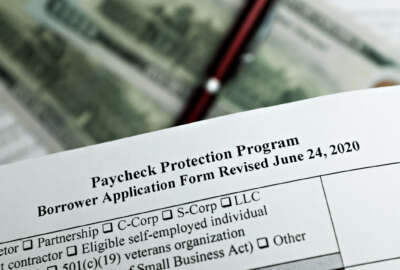First Look
Senate Republicans lead bill setting higher standard for SBA mentoring program
Republicans on the Senate Small Business Committee are leading a bill that would reorganize a Small Business Administration mentorship and training program.
Republicans on the Senate Small Business Committee are leading a bill that would reorganize a Small Business Administration mentorship and training program.
Committee Ranking Member Joni Ernst (R-Iowa) is introducing a bill Thursday along with Sen. Todd Young (R-Ind.) that would set a higher standard for SBA’s Service Corps of Retired Executives (SCORE) program.
The SCORE Act, introduced by Ernst and Young, would rebrand the SCORE program as “Supporting Coaching Opportunities for Resilient Entrepreneurs,” and would launch a National Women’s Business Coach program as part of SCORE.
The SCORE program matches small businesses with mentors who provide free counseling on how to start, manage and grow a business. The program aims to help small businesses access capital, develop new technologies and improve their business capabilities.
The bill would also rebrand mentors in SCORE as coaches and would establish a coaching certification program, to ensure mentors in the SCORE program have training on modern business practices, social media and e-commerce.
The SCORE Act would require mentors involved in the program to undergo annual performance reviews.
If a volunteer fails to meet performance standards in their annual review, the bill would require the volunteer to follow a performance improvement plan.
If the volunteer still doesn’t meet performance standards a year into their performance improvement plan, the bill would require the volunteer to be terminated and dismissed from the program.
The bill would also require the Government Accountability Office to issue a report on rural SCORE chapters and review their performance.
Ernst said in a statement that SBA’s SCORE mentorship program “is a well-intentioned idea with a poor payout and performance,” and that the program needs to do more to support female and rural entrepreneurs.
“Revamping this program to be more efficient and effective through improved services will support job growth, boost our local communities, and help more entrepreneurs achieve their dream,” Ernst said.
The bill would require the current SCORE cooperative agreement to be recompeted every five years, to ensure the contract awardee provides relevant business training to small businesses in urban and rural areas.
The SCORE Association, a national volunteer nonprofit organization, is the sole recipient of a cooperative agreement with SBA for the program. The SCORE Association has been an SBA resource partner for more than 50 years.
The bill would also allow the SCORE program to sunset within four years, unless Congress reauthorizes the program.
“Our bill will bring the SCORE program into the modern era of entrepreneurship, enhancing the essential role of mentorship by revamping it as focused, certified coaching,” Young said. “By ensuring continuous improvements in performance, we can open up new opportunities for rural and urban communities alike, solidifying SCORE’s role as America’s leading incubator for business mentorship and innovation.”
The SCORE Act would also authorize the Interagency Committee on Women’s Business Enterprise, which has been inactive for the past 15 years, to advise SBA, Congress, and the White House on the obstacles facing women’s business formation.
The SCORE program holds thousands of workshops and seminars every year on how to start and manage a business. SCORE usually charges a fee to attend these trainings.
The SCORE program relies on more than 10,000 volunteer business counselors to advise small businesses, lead seminars and coach business owners online.
The SBA inspector general’s office, in a 2019 report, found SCORE “commingled federal funds with unrestricted donations and used federal funds for unallowable, unallocable, and unsupported costs.”
Those costs include excessive bonuses, improperly awarded contracts and excessive local travel.
The IG’s office also found that SCORE inappropriately solicited donations for mentoring services, charged for publication materials that did not include the required SBA acknowledgment statement, and improperly managed funds for cosponsored activities.
Volunteers donate more than 1 million hours of service. SBA doesn’t compensate volunteers for their time, but does reimburse volunteers for out-of-pocket expenses. SBA’s Office of Entrepreneurship oversees the program.
An SBA spokesperson declined to comment, citing that the agency doesn’t comment on pending legislation.
Copyright © 2024 Federal News Network. All rights reserved. This website is not intended for users located within the European Economic Area.
Jory Heckman is a reporter at Federal News Network covering U.S. Postal Service, IRS, big data and technology issues.
Follow @jheckmanWFED
Related Stories

Lawmakers, IG question SBA decision not to pursue defaulted COVID relief loans




